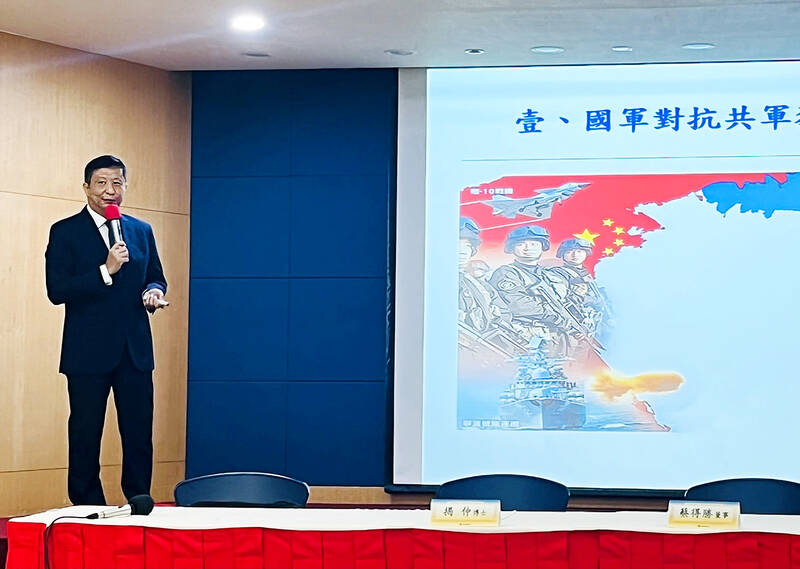The military appears to be scaling up its reserves due to concern over a possible Chinese invasion in 2027, including a 25 percent increase in the Ministry of National Defense’s budget to NT$133.7 billion (US$4.33 billion) for fiscal 2023, National Policy Foundation associate research fellow Chieh Chung (揭仲) said on Friday.
Another budget item, purchases of ammunition, is to rise to NT$8 billion, just shy of a four-fold increase from fiscal 2021, showing that the military is stepping up reserves to prepare for a potential protracted campaign on Taiwan proper without foreign aid, Chieh said.
The NT$1.92 billion to purchase ammunition, including missiles for shoulder-launched anti-armor weapons, indicates that the ministry is preparing to fight on Taiwan proper, he said.

Photo: Chen Yu-fu, Taipei Times
The ministry has budgeted NT$4 billion to purchase foreign arms, with the most significant portion designated for 30mm autocannon ammunition, he said.
The military is also setting aside funds to replenish equipment for ground forces, he said.
Taiwan’s ground forces have long lacked adequate equipment, with some only existing only on paper due to a long-term lack of funding for maintenance, Chieh said.
In addition to the standard NT$600 million to replenish personal combat gear for ground forces, the army is also to spend NT$1.75 billion to augment reserves of safety and combat components, and NT$4.6 billion to improve the bullet resistance of helmets, combat vests and other personal gear, he said.
The army has also budgeted NT$790 million for repairs of reservist equipment, restocking and other projects to ameliorate a severe shortage of equipment for reservists, a move that it hopes would shorten their time to mobilization, Chieh said.
However, there is a shortage of personnel in the reservist command, and planning needs to take place to increase the number of recall drills, so it remains to be seen if the reservist command can maintain the equipment it plans to buy properly, he said.
Maintenance expenses at the Air Force Command Headquarters for planes, anti-air equipment, telecommunications, radar systems, engineering and other support equipment have increased by NT$720 million to NT$19.2 billion in fiscal 2023, Chieh said.
The air force’s expenditure for F-16 components, budgeted at NT$950 million, has increased at least fourfold compared with fiscal 2022, he said, adding that the navy’s components and maintenance expenditure has also increased by NT$1.55 billion, or 26 percent, to NT$7.45 billion.

Chinese spouse and influencer Guan Guan’s (關關) residency permit has been revoked for repeatedly posting pro-China videos that threaten national security, the National Immigration Agency confirmed today. Guan Guan has said many controversial statements in her videos posted to Douyin (抖音), including “the red flag will soon be painted all over Taiwan” and “Taiwan is an inseparable part of China,” and expressing hope for expedited reunification. The agency last year received multiple reports alleging that Guan Guan had advocated for armed reunification. After verifying the reports, the agency last month issued a notice requiring her to appear and explain her actions. Guan

GIVE AND TAKE: Blood demand continues to rise each year, while fewer young donors are available due to the nation’s falling birthrate, a doctor said Blood donors can redeem points earned from donations to obtain limited edition Formosan black bear travel mugs, the Kaohsiung Blood Center said yesterday, as it announced a goal of stocking 20,000 units of blood prior to the Lunar New Year. The last month of the lunar year is National Blood Donation Month, when local centers seek to stockpile blood for use during the Lunar New Year holiday. The blood demand in southern Taiwan — including Tainan and Kaohsiung, as well as Chiayi, Pingtung, Penghu and Taitung counties — is about 2,000 units per day, the center said. The donation campaign aims to boost

The Kaohsiung Tourism Bureau audited six hotels in an effort to prevent price gouging ahead of Korean band BTS’ concert tour in the city scheduled for Nov. 19, 21 and 22 this year. The bureau on Friday said that the audits — conducted in response to allegations of unfair pricing posted on social media — found no wrongdoing. These establishments included the local branches of Chateau de Chine, Hotel Nikko, My Humble House, and Grand Hai Lai, it said, adding that the Consumer Protection Commission would have penalized price gougers had the accusations been substantiated. The bureau said the Tourism Development Act

The Central Weather Administration (CWA) said a magnitude 4.9 earthquake that struck off the coast of eastern Taiwan yesterday was an independent event and part of a stress-adjustment process. The earthquake occurred at 4:47pm, with its epicenter at sea about 45.4km south of Yilan County Hall at a depth of 5.9km, the CWA said. The quake's intensity, which gauges the actual effects of a temblor, was highest in several townships in Yilan and neighboring Hualien County, where it measured 4 on Taiwan's seven-tier intensity scale, the CWA said. Lin Po-yu (林柏佑), a division chief at the CWA's Seismological Center, told a news conference